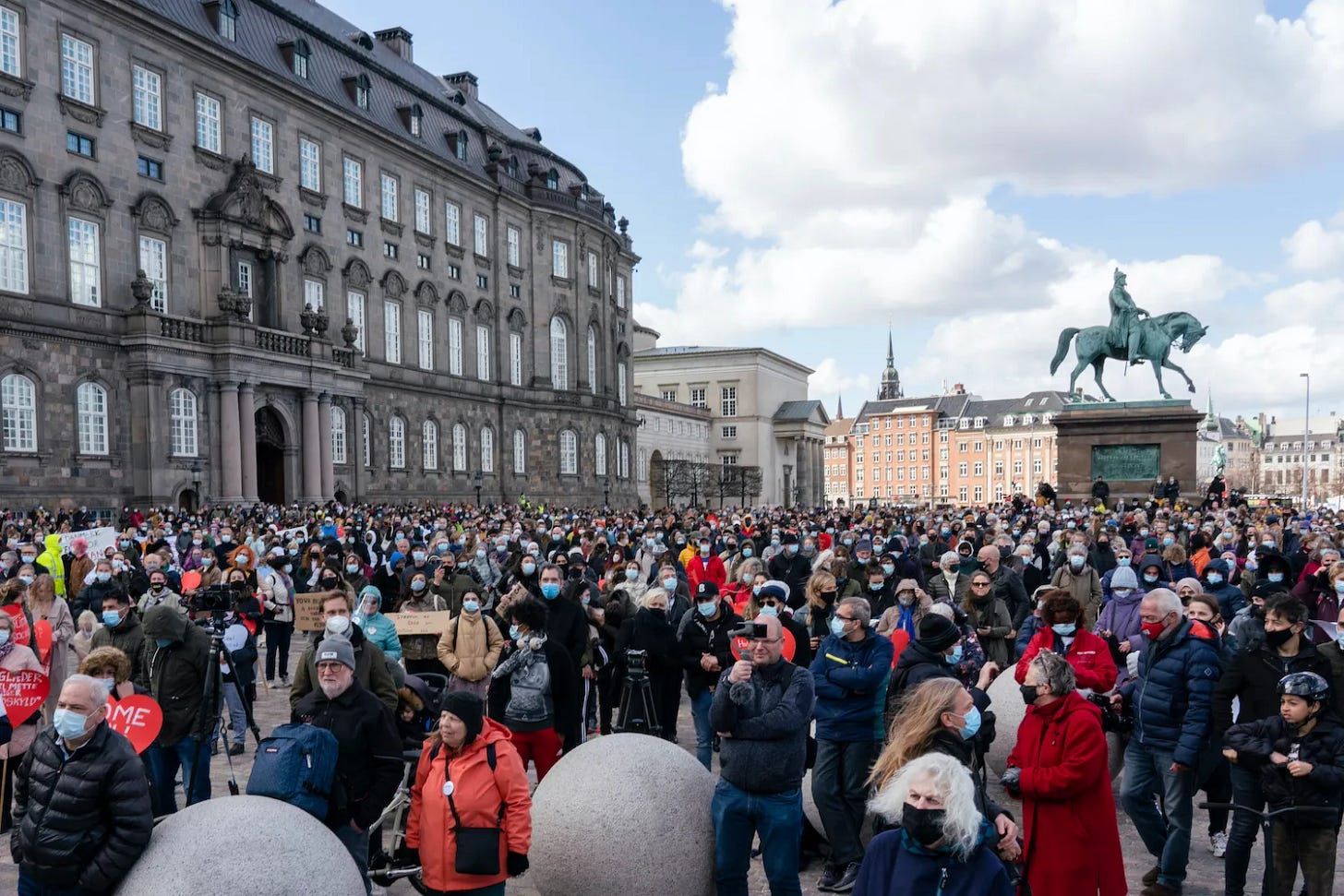On Danish Exceptionalism
In response to left-wing vacillation on migration, the European far-right is surging. If the left wants to maintain any political relevancy, it needs to evolve its messaging and reconnect with voters.
A spectre is haunting Europe - the spectre of mass immigration.
Buoyed by rising global temperatures, regional destabilization and worsening economic conditions, Europe is now enduring a wave of migration from the Third World that shows no sign of slowing down. In the UK, annual net immigration reached a historical high of 700,000 in the 2022-23 time period alone. Italy saw up to 130,000 migrants arrive by sea in 2022, a new year-high that matches the apex of the Euro Migrant Crisis. Asylum applications in Germany are also growing steadily and risk matching their peak in 2015.
A Political Headache
And these burgeoning migration figures are having a profound impact on each country’s domestic politics, upending the status quo and paving the way forward for populist parties to grow in strength.
In France, Emmanuel Macron’s flagship immigration bill, carefully designed with a mixture of repressive and liberal measures to appeal to left and right-wing lawmakers, was derailed by the fractured parliament, with both sides lamenting that it didn’t go far enough in ameliorating the issue. Now Macron is searching for a compromise. If one is not found soon, Marine Le Pen’s far-right National Rally will be able to capitalize on Macron’s failure ahead of the European Parliament elections scheduled for next June. It’s just as bleak in Germany, where, following a surge in asylum applications, the far-right AfD has eclipsed Chancellor Scholz’s governing SPD for the first time, now hovering around 22 percent in recent polls, second only to the centre-right Christian Democrats.
While the benefits of highly-skilled, targeted migration levels have long been praised, mainstream media and the political elite have largely ignored or downplayed the various economic and social disadvantages stemming from an open border regime.
The economic disadvantages of mass immigration are abundant. An increase in the supply of unskilled labour usually enables firms to fill vacancies with lower wages than previously due to the fact new migrants are willing to work longer hours for less pay than indigenous workers, thereby placing downward pressure on wages and potentially ousting native workers from certain job sectors altogether. Furthermore, if the increase in immigration is not matched by a similar increase in local investment, many communities end up experiencing higher pressure being placed on public services, such as schools, hospitals, and housing. We’re already seeing this play out across the UK. Just last year, a record number 700,000 migrants arrived in the UK. The number of houses built? Less than 200,000. Even the most sanguine supporters of migration have to admit that this is not sustainable. Either countries reduce immigration or they increase funding for the public sector to match the new intake of arrivals.
Just as perilous as the economic disadvantages are the problems mass immigration causes with social cohesion. The policy of open borders has been exacerbated by a failed assimilation regime that has not adequately integrated new arrivals into the culture. If new migrants are not properly integrated within their new communities, which has been the case in much of the developed world, then we start to see an erosion in the social fabric of that community. Wherever you look, be it London or Bradford, Munich or Malmo, you begin to notice a pattern - parallel societies are sprouting up, dividing cities and towns into a rough patchwork of different racial and ethnic enclaves. Instead of blending into their new communities and embracing the local cultures, migrants have confined themselves to microcosms of their old homes
The possibility of uncontrolled mass immigration from the Third World is arguably one of the biggest threats facing the West today, a fact that will only intensify over the coming years as global temperatures continue to rise, forcing millions of climate refugees to migrate north towards the sanctuary of Europe, which will, comparatively, be largely untouched by the worst excesses of climate change. And, in the face of this danger, Europe’s political elite remains silent on how to control it.
The Far-Right’s Salient Issue
In the absence of a national debate on this controversial issue, establishment forces have ceded ground to the far-right, who offer clear and distinct policy prescriptions, ranging from deportations to tighter border controls. This more confrontational attitude seems to be resonating with voters as far-right parties record substantial gains in opinion polling across the continent. Earlier this year, the far-right German party Alternative für Deutschland (AfD) made strong gains in elections in Hesse and Bavaria—expanding its footprint from its stronghold in the former east to states in the more affluent, cosmopolitan west. In France, the ‘National Rally’ regularly tops opinion polls and is expected to become the largest party in elections held next year for the European Parliament. National-Conservative parties are also rising in the Netherlands, Belgium and Finland, Romania and Portugal, the latter two of which were praised for not having any far-right presence in their parliament just a few years ago.
The right-wing is primarily winning this debate because left-wing forces steadfastly refuse to even participate, let alone offer alternative solutions.
Never has the dichotomy between voters and their left-wing representatives been more apparent regarding the topic of mass immigration and assimilation. Perplexingly, out of all the issues of the day, left-wing politicians seem unwilling to even contemplate changing course on messaging, instead preferring to regurgitate the same repetitive lines voters have heard ad nauseam - ‘closing the borders is racist’, ‘we have a duty to help these people’, ‘turning our backs on migrants is a reactionary idea’.
If the absence of debate wasn’t bad enough, the Left usually resorts to censorship, drowning out criticisms with accusations of bigotry or myopia, instead of substantially engaging with voter’s grievances. This stance has been replicated by almost all left-wing parties in Europe, resulting in their electoral oblivion as voters migrate to parties more willing to listen and act on their issues.
There has been one clear deviation from this pattern, however…
Why Denmark Offers A Framework
Through strict migration policies, Denmark seems to have developed a migration model that ensures a high employment rate for migrants along with few new migrants entering Denmark.
Denmark, a relatively homogeneous country, has implemented strict migration policies that are centred around two main goals: one area focuses on making it less attractive for migrants to come to Denmark. The other focuses on creating incentives for migrants already residing in Denmark to enter the workforce. Working in tandem, these goals aim to alleviate the concerns most voters have towards mass immigration.
These goals are achieved through lowering social benefits for migrants, enforcing stricter language requirements for entering Denmark and a continuous improvement of Danish skills to help migrants join the Danish workforce. It has also become harder to make family reunions for asylum-seekers and more difficult to obtain Danish citizenship while shorter deporting deadlines for unsuccessful asylum-seekers have also been enforced.
The policies are clearly working, as Denmark has seen a substantial reduction in non-Western migrants receiving public benefits and the number of arrivals fall far below the rate experienced by neighbouring countries. In 2004, 43% of non-western immigrants were being provided for by the state, in 2019 the number had dropped to 29%. Denmark also experienced the highest amount of employment (58,6%) for non-western immigrants in 40 years before the pandemic.
To the surprise of many outsiders, this regime of zero-tolerance has mostly been engineered by the centre-left Danish Social Democrats, who have held power since 2019. In stark contrast to the trend experienced by its brethren across the continent, the Danish SDP reversed its declining electoral fortunes by recapturing the narrative around immigration from the far-right, setting the terms of the debate. It worked perfectly. The party won re-election in 2022 by a much larger margin while its far-right competitors faded into irrelevancy.
Welfare states are only sustainable with the social trust that tends to only exist within a stable & culturally homogeneous population. Mass immigration combined with a social democratic welfare state will and cannot work. Highly diverse societies are low trust societies and low trust societies can't sustain a social contract of the sort that underpins the welfare state. Trying to defy this equates to political suicide.
These dynamics are why, until the late 90s, British Labour in government repeatedly restricted immigration (e.g. under Wilson/Callaghan). Mass immigration is only compatible with a liberal, globalised economic settlement that by its nature makes social democratic policies impossible. This is why the Tories allowed such high immigration - they wanted to destroy this trust and end the welfare state. Labour, under the Blairite wing, will continue this trend because their financial interests mostly align.
The Danish Social Democrats should provide European left-wing parties with a framework to work towards. Combining traditional left-wing positions on welfare, taxation and public services with an ardent opposition to mass immigration and open borders doesn’t just make sense ideologically, but it’s also a strong vote winner and the only way the rise of the far-right can be reversed.
While currently an outlier in the political landscape of most western countries, this fusion of ideas can offer left-wing parties a route back to relevancy and the easiest way of defusing far-right forces. The question is: are left-wing politicians willing to break with the current orthodoxy, disregard their party’s constitution and move towards a new status quo? At the moment, that looks increasingly unlikely.




